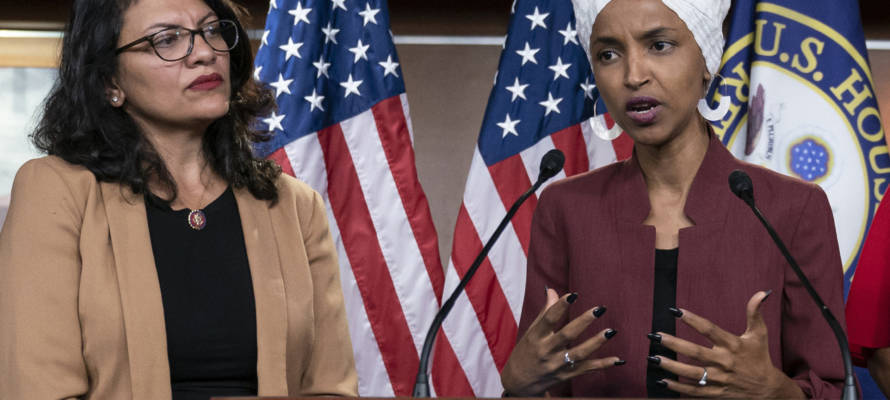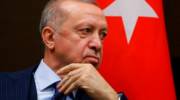How unusual was Israel’s refusal to allow Congresswomen Ilhan Omar and Rashida Tlaib to enter Israel to engage in hostile political activity?
By Prof. Hillel Frisch, BESA Center
Ilhan Omar and Rashida Tlaib are both first-term Democrat members of Congress. They are also both Muslims, inveterate Israel-bashers, and vocal supporters of BDS. Omar was born in Somalia; Tlaib is of Palestinian origin.
The pair had been planning to visit the Palestinian Authority on a purported “delegation to Palestine.” Israel refused to allow Omar entry, and granted Tlaib permission to enter on condition that she restrict her visit to family matters. Tlaib rejected those terms and will not be visiting.
Israel’s decision to bar Omar entirely and restrict Tlaib’s movements has aroused great interest and provoked much outrage. But how unusual was it?
A look at the visa policy of the European Union, which claims to be committed to equal and fair treatment, demonstrates how selective and discriminatory states can be when it comes to letting people in.
Nationals of only 62 countries and territories holding ordinary passports may enter the EU’s Schengen Area without visas. (This is the area in which free movement is allowed within the EU.)
Those 62 countries and territories are overwhelmingly wealthy and white.
As there are 193 member states in the UN, this policy implies that the nationals of only about a third of the world’s states can travel freely to the EU – and the overwhelming majority of states whose nationals need visas are from the Third World. Among them are the two most populous: China and India.
Discrimination hardly ends there. Nationals from states that require visas for entry into the EU are not treated equally. According to EU data, nearly 10% of 18 million visa applications were rejected – but the rejection rate was not uniform. The rejection rate for the African state of Nigeria was 49.8%; for Guinea, 46.8%; and for the troubled and poverty-stricken Democratic Republic of Congo, 46% – over four times higher than the overall average and more than 10 times higher than for nationals from Ukraine and Georgia, which are Christian states.
Nor do nationals from Arab states receive fair treatment: The rejection rate for Iraq is 47.8% and for Algeria 45.5%. This selectiveness even extends to visa fees. Adults from many Arab states must pay $70, but the cost is only $41 for nationals of Georgia, Kosovo, Russia, and Ukraine. Note that it is the nationals of the poorer countries who are the more heavily burdened by fees.
Given the tense relations between the EU and Russia, this largesse on the part of the EU can reasonably be held to reflect the EU’s preference for immigrants from that country.
Information is far more hard to come by regarding restrictions or refusal of entry for political reasons. The EU does not provide such information, and for the UK, it is dated.
UK: No Qualms About Refusing Entry
Yet even data from the first decade of the new century make clear that the oldest liberal democracy has no qualms about refusing entry to people whose convictions and rhetoric might harm British national security.
The persons refused entry were not criminals or people who had committed terrorist acts. Had they been active terrorists, it would have been incumbent upon the UK authorities to either extradite them to the countries where they had committed their crimes or, in the absence of acceptable international standards of justice in those countries, to place the terrorists on trial themselves.
Two individuals who were barred from entering the UK were American-Israeli Rabbi Meir Kahane and Israeli politician Moshe Feiglin. Neither had been tried in Israel for terrorist activities. Feiglin appeared on a list of 101 people denied entrance into the UK between 2005 and 2009.
Most of the people on the list, which included nationals from a variety of countries ranging from the US to Iran, were denied entrance on the grounds that they were “considered to be engaging in unacceptable behaviour by seeking to provoke others to serious criminal acts and fostering hatred which might lead to inter-community violence,” in the words of a Home Office press release.
Though most of the names on the list were reprehensible characters like Louis Farrakhan and American neo-Nazi Richard Spencer, whose barring would have elicited little protest except from bigots, the list also included “neutral” controversial people such as Julian Assange (whose “neutrality” changed when he was charged with sexual assault).
Omar, Tlaib Fit the Bill
Regarding Congresswomen Omar and Tlaib, they clearly fit the bill of “seeking to provoke others to serious criminal acts and fostering hatred which might lead to inter-community violence.” Their inflammatory rhetoric threatened to inflame existing passions among those who wish to harm Israelis.
This is especially true in light of the proportionality principle so often invoked in liberal states. The incidence of refusal of entrance must take into account the relative threat to national security. The threat of terrorism is much greater in Israel than it is in the UK, measured either in terms of victims or in terms of arrests of would-be perpetrators. Israel is thus entirely justified in refusing entrance to people whose expressed aim is to harm Israeli national security.
Both Israelis and Palestinians are better off with Tlaib and Omar remaining in the US. There, one hopes they will work on behalf of their constituents rather than spend their time trying to provoke violence in the Holy Land.
Sign the Declaration to Keep Jerusalem United
Jerusalem Must Remain the United Capital of Israel
I declare that Jerusalem is the eternal capital of the Jewish People and support all efforts to maintain and strengthen a united Jerusalem as the undivided capital of the State of Israel.
Do You Love Israel? Make a Donation - Show Your Support!
Donate to vital charities that help protect Israeli citizens and inspire millions around the world to support Israel too!
Now more than ever, Israel needs your help to fight and win the war -- including on the battlefield of public opinion.
Antisemitism, anti-Israel bias and boycotts are out of control. Israel's enemies are inciting terror and violence against innocent Israelis and Jews around the world. Help us fight back!
























